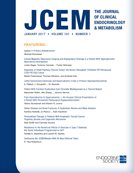-
Views
-
Cite
Cite
MARIS R. DAVIS, HARRY SHAMOON, Counterregulatory Adaptation to Recurrent Hypoglycemia in Normal Humans, The Journal of Clinical Endocrinology & Metabolism, Volume 73, Issue 5, 1 November 1991, Pages 995–1001, https://doi.org/10.1210/jcem-73-5-995
Close - Share Icon Share
Abstract
We evaluated the effect of antecedent hypoglycemia on glucose counterregulation during hypoglycemia in nondiabetic human subjects. In single hypoglycemia studies, glucose production ([3H]3-glucose) and counterregulatory hormone concentrations were measured (after a 3.5-h baseline period of euglycemia) during 120 min of hypoglycemia (glucose clamped at 3.0 mmol/L). During the final 60 min of hypoglycemia, counterregulation resulted in significant increments in glucose production (12.88 ± 0.83 μmol/kg ⋅ min), and plasma glucagon (IRG; 185 ± 22 ng/L), GH (29.3 ± 7.0 μg/L), cortisol (630 ± 100 nmol/L), epinephrine (3.44 ± 0.76 nmol/L), and norepinephrine (2.02 ± 0.21 nmol/L). In the recurrent hypoglycemia experiment, an antecedent period of identical hypoglycemia was induced. Glucose counterregulation during the second of two periods of hypoglycemia (HYPO 2) was then compared to that in single hypoglycemia studies. During HYPO 2, there were decreased responses in Ra (by 32% P < 0.03), GH (by 67% P < 0.05), F (by 41% P < 0.03), and norepinephrine (by 20% P = 0.03) compared to those in the single hypoglycemia study. In contrast, plasma IRG values were similar in the single hypoglycemia studies and HYPO 2, but were reduced relative to those during the first hypoglycemic period of recurrent hypoglycemia (IRG, 263 ± 18 ng/L; P < 0.025 vs. HYPO 2 and P < 0.05 vs. single hypoglycemia). Our results suggest that 1) antecedent hypoglycemia may alter glucose counterregulation during hypoglycemia; and 2) recurrent hypoglycemia may result in alterations in reduction of hepatic glucose production.





